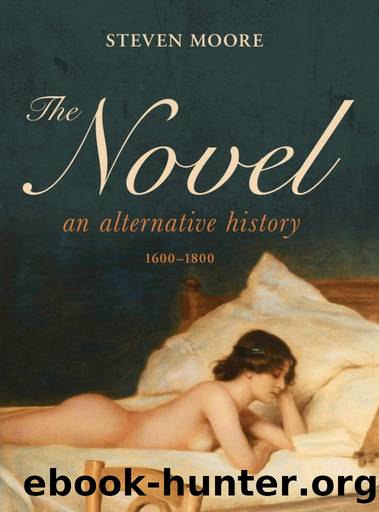The Novel: An Alternative History: 1600-1800 by Steven Moore

Author:Steven Moore [Moore, Steven]
Language: eng
Format: azw3
Tags: Literary Criticism, Nonfiction, History
ISBN: 9781623567408
Publisher: Bloomsbury Publishing USA
Published: 2013-08-28T23:00:00+00:00
behind the misty clouds
They headed toward some village lights
and safely made their way.
[
The scene shifts and we are with Yonehachi in her new Fukagawa quarters, surrounded by three or four singers.
]
Yone:
Umeji-san, I really am quite sure I want to do it that way.
Ume:
No one will make a fussâgo ahead and do it! [
Masaji is seated nearby plucking her eyebrows.
]
Masa:
Who cares! They always cry sour grapes when that happens.
Yone:
Well, I feel like following your advice and telling him off.
Ume:
Feeling like doing it isnât enough, honeyâI remember that much! Masa-san, do you remember how it was with KÅ-san?
Masa:
Exactly! You were fit to be tied. The Åtsu-yaâs mama certainly stood you well then. [
In this interval, Yonehachi finishes tying her obi, and holds out a teacup.
]
Yone:
Ume-san . . . pour a little here, would you? [
Umeji, reaching beside the hibachi picks up an earthenware bottle.
]
Ume:
This?
Yone:
Youâre a quick one, arenât you?! The one over there, dear.
Ume:
Oh, that! [
Taking out the heated bottle of saké next to it, she fills her teabowl to the brim. Yonehachi tosses it off in one gulp and strikes her breast. She gasps two or three times and clicks her teeth together.
]
Yone:
Iâm off, dears.
Others:
Weâre all behind you â really tell him off! [
Yonehachi, smiling brightly, departs.
]
103
Note the realistic dialogue and actions, and especially the absence of referentsâthe unidentified âhimâ is Tobeiâwhich sometime makes the novel hard to follow, especially at the openings of chapters, but thatâs deliberate. In one of his many authorial addresses to the reader, Shunsui warns: âSince the authorâs method is to leave for later what ought to be explained at first, there will be places that are difficult of comprehension, and the reader is urged to pay close attention along the wayâ (21). Perversely, this appears four chapters before the end, way too late for the inattentive reader. But on other occasions the author is more than willing to assist the reader, to make his motives clear, or even to interrupt the story to record his experiences while writing, as in this sequence:
Drawing OchÅ close by her side, [Konoito] is suddenly convulsed with weeping. Although crocodile tears are common among this breed of women, Konoitoâs sincere affliction here reflects her gentle perfection.
. . . The author, at the time of this writingâlate one night during the month when chrysanthemums bloomâcan hear the first call of the wild geese on their southward migration. . . .
To such a gentle Courtesan
I must send a message with
the wild geese to her pillow-side.
But meanwhile, OchÅ too, at Konoitoâs ever so gentle words is struck down with weeping. Wailing, her body quivering, she looks up. (3)
Elsewhere, heâll record the poems friends left with him after visiting, or follow a spicy scene with a bogus disclaimer:
The author takes this opportunity to interject; this work is aimed solely at the exposition of the Sentiment of Yonehachi, OchÅ and the others. It is not intended to satirize the Quarter. I have never been well-acquainted with the Temples of Entertainment, and consequently can only give the briefest sketch of its life.
Download
This site does not store any files on its server. We only index and link to content provided by other sites. Please contact the content providers to delete copyright contents if any and email us, we'll remove relevant links or contents immediately.
Twisted Games: A Forbidden Royal Bodyguard Romance by Ana Huang(4031)
The Push by Ashley Audrain(2702)
Den of Vipers by K.A Knight(2701)
Win by Harlan Coben(2665)
Echo by Seven Rue(2248)
Baby Bird by Seven Rue(2224)
Beautiful World, Where Are You: A Novel by Sally Rooney(2181)
A Little Life: A Novel by Hanya Yanagihara(2154)
Iron Widow by Xiran Jay Zhao(2127)
Leave the World Behind by Rumaan Alam(2100)
Midnight Mass by Sierra Simone(2015)
Bridgertons 2.5: The Viscount Who Loved Me [Epilogue] by Julia Quinn(1796)
Undercover Threat by Sharon Dunn(1791)
The Four Winds by Hannah Kristin(1775)
Sister Fidelma 07 - The Monk Who Vanished by Peter Tremayne(1670)
The Warrior's Princess Prize by Carol Townend(1632)
Snowflakes by Ruth Ware(1601)
Dark Deception by Rina Kent(1570)
Facing the Mountain by Daniel James Brown(1553)
